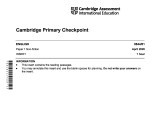|
Download [PDF] October 2020 CAIE P1 Insert 0844 English Cambridge Primary Checkpoint
|
File Information
| Filename: | [PDF] October 2020 CAIE P1 Insert 0844 English Cambridge Primary Checkpoint.pdf |
| Filesize: | 542.81 KB |
| Uploaded: | 28/02/2022 19:42:50 |
| Keywords: | |
| Description: | Download file or read online CAIE Cambridge primary checkpoint past exam paper English 0844/01/INSERT/O/N/20 October/November 2020 insert paper 1 - Cambridge Assessment International Education |
| Downloads: | 136 |
File Preview
Download Urls
Short Page Link
https://www.edufilestorage.com/3Q5
Full Page Link
https://www.edufilestorage.com/3Q5/PDF_October_2020_CAIE_P1_Insert_0844_English_Cambridge_Primary_Checkpoint.pdf
HTML Code
<a href="https://www.edufilestorage.com/3Q5/PDF_October_2020_CAIE_P1_Insert_0844_English_Cambridge_Primary_Checkpoint.pdf" target="_blank" title="Download from eduFileStorage.com"><img src="https://www.edufilestorage.com/cache/plugins/filepreviewer/4761/pdf/150x190_middle_46f4e7862b1eb5bd4935adbbba5d79e8.jpg"/></a>
Forum Code
[url=https://www.edufilestorage.com/3Q5/PDF_October_2020_CAIE_P1_Insert_0844_English_Cambridge_Primary_Checkpoint.pdf][img]https://www.edufilestorage.com/cache/plugins/filepreviewer/4761/pdf/150x190_middle_46f4e7862b1eb5bd4935adbbba5d79e8.jpg[/img][/url]
Related Files | 7
Download file
[PDF] October 2020 CAIE P1 Insert 0844 English Cambridge Primary Checkpoint [PDF]
[PDF] October 2020 CAIE P1 Insert 0844 English Cambridge Primary Checkpoint [PDF]
[PDF] October 2020 CAIE P1 Insert 0844 English Cambridge Primary Checkpoint.pdf | Plain Text
This document has 4 pages. Blank pages are indicated. IB20 10_0844_01/RP © UCLES 2020 [Turn ove r Cambridge Primary Checkpoint ENGLISH 0844/01 Paper 1 Non-fiction October 2020 INSERT 1 hour INFORMATION • This insert contains the reading passages. • You may annotate this insert and use the blank spaces for planning. Do not write your answers on the insert.
2 © UCLES 2020 0844/01/INSERT/O/N/20 Text A Should a child over nine years old choose their own bedtime? This is not a simple question. One side will argue that science proves children need a lot of sleep. The other side will say that children have to learn to take care of themselves, and giving them the responsibility for choosing their bedtime is an important step. Those in favour of a child choosing their own bedtime believe a child should learn to set their own day-to-day routine. In fact, many teenagers argue that they are the ones who understand their daily timetable best. So, bedtime should be their decision. Supporters are adamant this teaches young people self-discipline – a vital life skill, in their opinion. Many children also point out that they would be less stressed about studying in the evenings if they could choose their own bedtime and adjust it to suit their workload. In addition, they would have time each evening to talk to their families. Supporters also say that children do know when they are tired and can manage tiredness by deciding when it’s bedtime. Moreover, children become independent and develop a trusting relationship with their parents. The result of this is fewer family arguments. On the other hand, most parents think children make bad decisions about bedtimes. In their opinion, parents judge best what is right for a child and will make sure a child gets enough sleep so they can concentrate appropriately at school. Scientific research shows that children younger than ten need more than 11 hours’ sleep a night to stay healthy and grow; even teenagers need ten hours a night. Consequently, opponents emphasise that tired children become bad- tempered, find daily tasks hard, and are likely to get ill. Perhaps the best answer is to ‘meet in the middle’. If parents set bedtimes during the week, then at weekends or holidays children could choose, giving them more independence and an understanding of how to care for themselves as they grow. 5 10 15 20 25 DO NOT WRITE IN THIS SPACE
3 © UCLES 2020 0844/01/INSERT/O/N/20 Text B Sleep Every creature needs to sleep. Babies, elephants, kids, koala bears, grandparents, and hippos in the jungle – they all sleep! Just like eating, sleep is necessary for survival. What happens during sleep? Sleep gives your body a rest and allows it to prepare for the next day. It’s like giving your body a mini-vacation. Sleep also gives your brain a chance to organise everything. Scientists aren’t exactly sure what kinds of organising your brain does while you sleep, but they think sleep might be the time when the brain sorts and stores information, replaces its chemicals and solves problems. How much sleep do people need? The amount of sleep a person needs depends on their age. Babies, of course, sleep a lot – about 14 to 15 hours a day! But older people need only about seven or eight hours of sleep each night. Most children between the ages of 5 and 12 years need 10 to 11 hours of sleep. Did you know? • Missing one night of sleep makes a person grumpy and clumsy. • After missing two nights of sleep, a person will have problems thinking and doing things; his or her brain and body won’t be able to do simple tasks properly. • After five nights without sleep, a person will hallucinate. (This means seeing things that aren’t actually there.) • Eventually, without sleep, it becomes impossible for the brain to give its directions to the rest of the body – the brain needs to spend time in bed and catch its ZZZs! 5 10 15 20 DO NOT WRITE IN THIS SPACE
4 Permission to reproduce items where third-party owned material protected by copyright is included has been sought and cleared where possible. Every reasonable effort has been made by the publisher (UCLES) to trace copyright holders, but if any items requiring clearance have unwittingly been included, the publisher will be pleased to make amends at the earliest possible opportunity. To avoid the issue of disclosure of answer-related information to candidates, all copyright acknowledgements are reproduced online in the Cambridge Assessment International Education Copyright Acknowledgements Booklet. This is produced for each series of examinations and is freely available to download at www.cambridgeinternational.org after the live examination series. Cambridge Assessment International Education is part of the Cambridge Assessment Group. Cambridge Assessment is the brand name of the University of Cambridge Local Examinations Syndicate (UCLES), which itself is a department of the University of Cambridge. © UCLES 2020 0844/01/INSERT/O/N/20 BLANK PAGE








